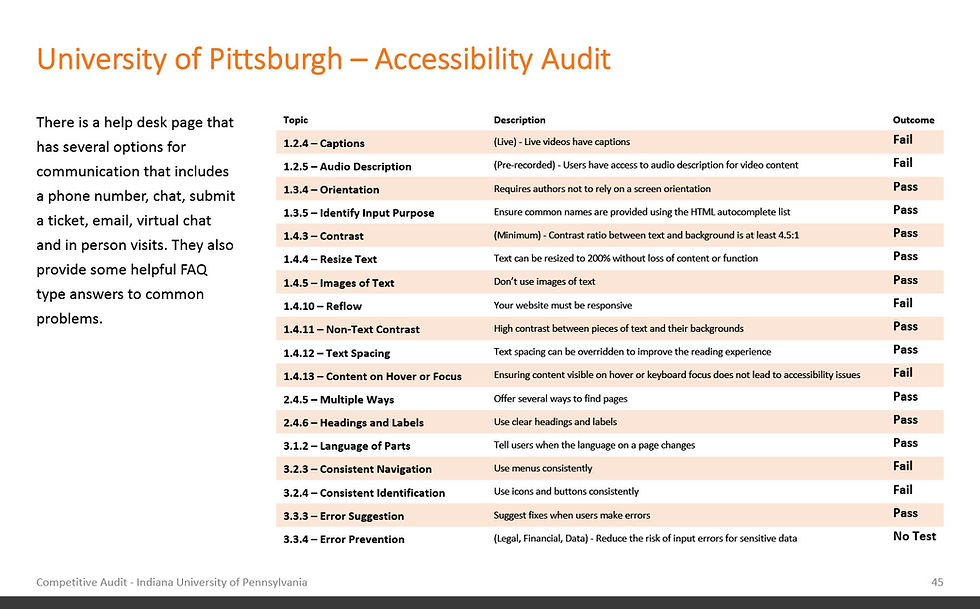
PROJECTS INCLUDED
Market and User Research, Usability Testing, Design System, User Testing, and Website Redesign
UI/UX. DESIGN SYSTEM. WEBSITE REDESIGN.
IUP Website Redesign
Indiana University of Pennsylvania (IUP), known for its exceptional academics, significant research initiatives, and friendly atmosphere, sought innovative methods to showcase its offerings to prospective students. The IUP team aimed to connect with their target audiences in a distinctive manner that set them apart from other colleges. In addition to rolling out a fresh marketing campaign, they also aimed to revamp their website to better align with their mission of catering to diverse needs and prioritizing students in all their endeavors.

For nearly 150 years, Indiana University of Pennsylvania has delivered a highly personalized, intimate, and affordable learning environment. In 2020, IUP set out an 8 year strategic plan designed to transform the culture at IUP to enhance the student experience by fostering exceptional student-centeredness. This transformation has included reordering resources to ensure every student is engaged and can be successful at every point in their journey—transitioning to the university, while enrolled at IUP, and after their time at IUP. Over the years IUP has become the second most affordable college in Pennsylvania with over 160 associate's, bachelor's, master's, and doctoral programs and over 9200 students.
While at Brunner I helped elevate Indiana University of Pennsylvania (IUP) mission of being student centered by providing an in-depth discovery process that included focus group sessions with their primary audiences as well as key stake holders. We took the information gathered and provided them with a website redesign that is user centered with customizable content layouts based on the persona selected as well as an overhaul to their site structure.

Competitive Audit
To gain a clearer perspective on the landscape in which we were pioneering change, we set out to examine the strategies of IUP's industry counterparts and began with a SWOT analysis as our starting point.
This investigation revealed a major opportunity to break away from traditional site designs by creating tailored content for various user groups, while also updating the overall look to a more modern aesthetic.
Additionally, we uncovered various potential threats, notably the absence of the extensive history of achievements, accolades, and successful alumni that many larger research institutions possess.

IUP Personas
In our discovery process, we conducted focus group sessions with both the main audiences and important stakeholders. This effort allowed us to pinpoint five main user categories that access a college website: Intentional Perspective Students (who have specific goals), Exploring Perspective Students (who are still figuring out their direction), Parents, Current Students, and Graduate Students. In addition to these main groups, we also recognized three other user types: Alumni, Graduate Students, and Transfer Students.
Each group has unique reasons for visiting the site, the design predominantly serves Intentional Perspective Students, which often leaves the other user types feeling frustrated. Addressing this issue became a central challenge in our redesign efforts.

Experience Framework
Recognizing that the website experience serves as the institution's first impression, we sought to illustrate how the college accommodates a variety needs and put the students first. The data we collected enabled us to propose three distinct strategies for achieving this: creating dedicated sections on each page for each user persona, designating a small area of the site for each persona, or allowing users to select their persona type, which would dynamically adjust the website’s layout and content to better meet their needs. I was thrilled when the latter option was selected. Although this choice required a more significant development effort, it resulted in an award-winning experience that was groundbreaking in the industry.

Wire Frames
Once we defined the desired experience for IUP's new website, we began the process of completely restructuring it and gathering content. To facilitate this, we utilized Axure to create interactive wireframes that illustrated the proposed content and layout of the site. This approach enabled us to share the page designs with our copywriters, who then collaborated with each college department to develop their respective sections.
These wireframes also served as basis for initial user testing, ensuring that our structure, functionality, and interactions were user-friendly at a fundamental level before advancing to the design phase. Additionally, they played a crucial role in streamlining the overall development and approval process. The wireframes allowed developers to start working on basic layouts and backend development while we finalized the designs. This approach expedited the approval process by enabling us to secure client approvals for content, structure, and layout before introducing branding and design elements, helping the client concentrate on one aspect at a time rather than feeling overwhelmed by multiple considerations.


Webstire REDESIGN
After finalizing the wireframes and receiving client approval, we began creating the foundation of the website's design system. This allowed development to move forward with creating the basic UI components. Concurrently, we designed detailed prototypes for different page layouts and completed the design system with more complex components and alternate layouts.The updated design effectively showcased the new IUP branding, met level AA ADA compliance, and offered an intuitive user interface that facilitated easy navigation for users.


The redesign of the website and the branding initiatives were met with enthusiasm from both faculty and staff, and it was clear that they also received favorable feedback from outside the institution. Our initiatives led to a significant rise in applications by enhancing engagement. Notable outcomes included a 14% year-over-year increase in goal completions, a 63% year-over-year rise in new users, a 33% year-over-year growth in user sessions, and a 53% year-over-year reduction in bounce rate.

Positive Results


Had a little help from some friends
Laura Swearingain
Creative Lead
Matt Penoyar, Aaron Cacali
UI/UX Designer
DEVELOPMENT
Brunner Team
AGENCY
Brunner Works




